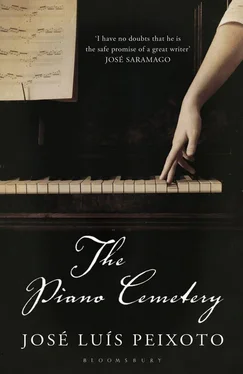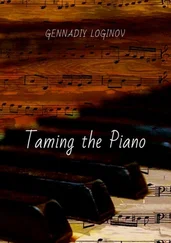Kilometre twenty-five
the springs of the cart. Simão and I and three men from the taberna unloaded the piano. Earlier, at the man’s house, standing at the piano, when he named his price, my brother came up to my ear and whispered, ‘Take it.’ I remained silent, as if thinking. I looked at the piano, I looked at the man, I looked at the piano, I looked at the man and said half the sum he’d asked for. He accepted at once. As we crossed the entrance hall of the workshop with the piano — a weight crushing us against the floor — I could see that the men couldn’t cope. We stopped. We had a breather, and started again. We put it down in the carpentry shop. We went to the taberna and drank two glasses of wine. As we came out, it was January. In the carpentry shop, the upright piano, varnished, with secret scratches. Simão was talking, telling stories, making up futures. I walked round and round the piano, I concentrated. Then, at a given moment, I stopped and put my index finger on a key — a lame note. With that note began a whole week of me and Simão spending all our mornings and all our afternoons around the piano. Hours followed one another slowly, I thought about her, my brother would go to the piano cemetery to look for parts and would come back satisfied with pressure bars, hammers, rods. I felt a tenderness towards Simão’s blind, smiling face, my brother, my brother. Then I’d leave him at the taberna and go to train. I ran in a time that was constant combustion, a flame blowing inside me. Like blood I ran through the veins of Lisbon, touched its heart, penetrated its heart, and then, more slowly, extracted myself, undid myself and came out. A secret from myself. I’d arrive home and find a place held in suspension. My wife under the oil lamp, her belly, our child forming, slowly growing, waiting for a moment. Like now
a given moment in time. Now. Now is a stake, driven into the surface of time, just as it might be stuck into the earth. All the cords of time are supported by this stake and they can hold up a tent as huge as the sky. The gardens around the entrance to the stadium have been left behind a long time or short time or long or short time ago. With each step, a different now. I run, carrying time. I take a step, now, another step, another now, and on I go — now, now, now. I’m not scared any more. I’m alight with my certainties. I can accept naturally that, now, my father has just died; just as, now, my sister Maria has fallen off the bicycle at the Monsanto picnic; just as, now, my niece Elisa has just been born; just as, now, I am here, frozen in this moment, at this step, replaced by the next, replaced by the next. Wherever my wife is, that moment exists. It’s so different and it’s just the same, the same moment. Wherever my mother is, there’s this moment which for her lasts much longer or much less time. Where I am. Here, on this road. Here, where I could be if I closed my eyes. All time, the years and decades I’ve lived, that I’ve not lived, that I will live and that I won’t live, it all exists in this moment. I fall — my cheek to the floor, the sun pushing my shoulders and not letting me get up, now, time, my knees burning, the palms of my hands on the ground, an incandescent sheet, red-hot, the heavy boiling air that fills me up
don’t leave me
and I get up. Slowly. Slowly. The weight of my body — a mountain — on my arms. My knees — the trunks of the plane-trees in the garden — bend. I go on
together. We looked at the piano proudly. Once again we were aware of being capable and of being endlessly brothers. We were made of the same impossible, unpronounceable words. Simão left me to go and fetch the man with the cart. When the sound of his steps had disappeared, I put a stool down in front of the piano, sat down, and played a piece with notes spaced out, that I made up, and that I felt. Time. Afternoon. My brother came back, already with a few men from the taberna . I was seated facing the silence. I sat down next to the cart man. He held on to the bridle, I had my hands resting in my lap. People were frozen on the pavements to watch the piano, tied up, solemn. Behind us, my brother went with the men from the taberna , on foot, chatting about nothing, their phrases left unfinished. The lady stood amazed when she opened the door. The lady stood amazed as she followed us with her gaze. In the corridor we huddled so as not to knock off any pictures, so as not to scratch any furniture. When we came to corners we’d manoeuvre backwards, forwards, backwards, forwards. In the hall, the place of the grand piano was empty and clean. The burned part of the rug was covered by another rug, like a patch. The walls around the piano were clean, but worn down from having been scrubbed. We put the piano up against the wall next to the window. The lady’s eyes shone. She stood there, arms down by her sides. The men left, led out by Simão. The lady looked at me for another moment, and went out. She came in. Her hair was still long and smooth, her lips perfect, her skin white. Inside I was slowly trembling. I was about to tell her I still wanted her, I still felt the same way, but my will was stopped in its tracks
Kilometre twenty-six
because I heard the front door open and close, because I could make out the silent footsteps along the hallway runner. And the lady came back into the hall, followed by the tuner. He knew I was there, and said my name — Francisco. His voice disappeared into the air. The tuner, blind, couldn’t see our serious faces, and maybe that was why he smiled. I gave him my hand to lead him. Suddenly it was me, her and the tuner. She had her hands on her stomach and she was beautiful. I remembered the first day I saw her. I tried, struggled to think of other things, but I looked at her and all I could remember was the first day I saw her. And at that moment there was so much I wanted to tell her. I wanted to tell her everything I thought, I had been, I still was, but I remained silent, passed through by each isolated note that the tuner played, by the cry, almost inaudible — but unique, unique — of the piano strings being stretched — the groans of flowers dying. At the sudden moment when I walked out of the hall, the tuner turned his head, not understanding. She — hurt, wounded — didn’t look at me. And I, wounded by myself, continued to walk, to flee, continued along the corridor, along the streets until I was even more lost to everything, until I had lost myself completely.
through the sun. The ground tilts under my feet. In the distance a whole garden that wavers, trees going up and down. I put one foot down on the road and I feel it escape, I feel it tipping. I put down the other foot and it’s already tipping the other way. At the same time the ochre façades fade into every luminous colour — white, yellow. And they move away, and they move closer. They waver within their outlines, they transform themselves into smudges that burn like poppy petals, oil-lamp flames, they waver
father
before being born. The child
the hall mirror. And Marta, proud of her nearly new house, filled with nearly new things. A plaster doll on a bookcase. Its arm broken on the trip, but I’ll glue it back. And she was smiling. Proud of the copper pans hanging in order of size, of the porcelain penguin, of the large wall clock that lost ten minutes a day, the hall mirror that already wasn’t big enough to reflect all of her, a new pan, washed cutlery. Looking at me. Proud of the discoloured frame where she kept a photograph of our sister. Her holding it, giving it to me, showing it to me. Maria
with Maria. Just like when they were girls and they locked themselves away in their room. Our mother would forget to call them. Just like when they knew exactly the same secrets. They were girls, sisters. They laughed, just the two of them, at the same jokes. They were the only ones laughing. My father would look at them, straight away giving up trying to understand them. Simão didn’t get close. I was the little boy. I handed her back the frame. I looked at her again. She smiled, and her face wasn’t at that moment, it was at a time that only for her had not been lost, in a past that only she still recognised. She put down the frame when Elisa woke up. Uncle, Uncle. Cheeks flushed. And Marta smiling, showing me the bedroom. Proud of the little bedside tables, the chest of warped drawers. Returning to the kitchen, Elisa snuggled in my arms. And Marta: ‘Do you want to see what we’ve got here? Go and show your uncle.’ And me putting Elisa down on the floor, a little girl. Her walking barefoot towards a photograph of me, resting on the lowest shelf of the cupboard, holding it with both hands, almost dropping it, holding it and giving it to me. The two of them looking at me, smiling, proud. I
Читать дальше












